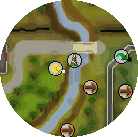In 2004, Runescape was a different game. Skills took a lot of time to train, and the game was relatively new. Many players had not reached stats above 70 yet. It meant players had the game ahead of them, and many things just took more time.
There was no Grand Exchange, and trading obviously took more time. You had to first assess the value of an item. Many would ask their friends, while others would check the forums. A third group would hop straight to world two, where they would see the price at a given minute. Today, I clean my bank in seconds, selling off everything for “minimum price” and pocketing the tasty difference whenever someone is willing to pay more.
When those who started playing Runescape long ago reminisce over times passed, one of the most common complaints uttered in slight lament is that things have become too easy, too streamlined in today’s Runescape. What does that implicate?
With a streamlined Runescape, you attain all of your goals and desires quickly. The game becomes, as many moan, easier. These tired words do have significance, but for all the unexpected reasons.
The Runescape of years past, where you simply couldn’t get a Guthix kiteshield because no one online was selling, are just that: a distant past. But it was an exciting past, and that is where we find the exciting options available in the future of Runescape. Attaining an item could be a quest in itself. There was challenge, and many of these challenges could only be overcome by cooperating with your fellow players.
As skills were not something many had in the 80s and beyond, elite content was simply not required in the game, because so few would need it and the limits were hard enough to reach. There was no need for potions that required a higher Herblore level than the Zamorak brew and its Saradomin counterpart. It was simply hard enough to find someone who could make the high-level potions.
That forced players to cooperate, and cooperation fosters niche specialization. In other words, people specialized in different skills. I made potions, my friend mined runite ores, and another would smith weapons and armour. Together we killed bosses no one dreamt of soloing. We grouped up to go player killing or runite ore hunting, and our combat preferences determined our success. One could bind and mage, another could range, and some of us were mêléers. We all scouted worlds for ore and pkers, so our valuable rune miners could score us the great prizes. We would pay for the services of one of the rare rune smiths, as we knew none other than through business.
As players specialized in the past, Runescape had many dimensions. Day-to-day activities required cooperation, and the game was simply more varied. Today, we have an economy that is so centralized with supply and demand that attaining the resources for potions is an inefficient way of gaining those items. The most effective and common way is to grind through the most profitable task, sell the produce, and use the money to buy what we really wanted. Playing this way, Runescape easily becomes monotonous, repetitious and one-dimensional.
“Oh no, what happened to Runescape for it to degrade into such an abyss of darkness and despair!” you may be thinking (okay, not really, but humor me). Fear not, for there is a clear hope. We can specialize in much more exciting ways than in the past, because the game has developed, and most have become proficient in many skills. There are two primary ways in which Jagex can successfully develop the game in exciting new directions.
Similar for both are the necessity for cooperation to perform many tasks. Cooperation fosters creativity and diversity. This develops inter-player relationships and different complementary roles should be the foundation of most activities. Also necessary is the requirement that combining different roles is the most efficient way of doing things. The efficient method is the method of choice.
In some ways, we still do specialize. Some still concentrate on certain skills that others don’t commonly advance (Runecrafting, Crafting, and Smithing come to mind), but the GE renders these players of little use to their friends. They don’t provide the most effective method of doing things. Those with special stats should be performing important roles in the game; more players would therefore level the skills as new roles appear for them. This leads to game diversity, where players perform different tasks, rather than repeating the same thing over and over again.
We choose our spellbook and prayer set. We choose to “tank a boss” or to be the mage while killing dagannoth kings. But many times, there are many players playing similar roles. That is one of the ways Jagex needs to diversify. Bosses should be remade. Most are too easy today. All bosses should be most effectively killed with at least one mage, one ranger and one mêléer. Thus the combat triangle is stabilized, and players can vary what role they wish to hold. Suddenly the same boss produces three activities. Someone who enjoys being a mage may enjoy the other roles and find diversity in a single activity, or those who don’t inherently like bosses may find that a single role at most bosses is more fun. Their friends need them, meaning relationships revolve more around in-game activities, just as in the past.
There are more activities where different roles should emerge. Quests involving cooperation with players who make different choices is a niche Jagex explored early on in the game, but moved away from. That was a mistake. With some creativity, Jagex could have realized that players should be able to remake the choices, and choose the other alternative. Having to rely on another player to complete the quest is something that should be continued. Finding one other player when there are a hundred thousand online should not be a problem, especially with themed worlds.
This article will not consider leveling skills where group activities are required, but they should be a viable option. Player interaction in a massive multiplayer game should be highly encouraged. What will be examined are the exciting options available to Jagex that are similar to content they have already released with massive success. Extreme Herblore potions, and their untradeable nature are examples of content that simply begs for the use of varied roles, such as integrating skills with boss fighting and quests. Non-tradable equipment and capabilities mean players cooperate for efficiency.
Runescape has currently developed beyond the classes of the past. It needs to develop for class-played content in the future. Being able to perform all classes on a single character is an advantage Runescape holds over its competitors. However, different roles in the future lead to more variation in the game, and variation is what will keep us playing.
How should Jagex move forward? They should rework the bosses currently in the game. They should be more difficult, and all should require teams of different roles to fight. Rather than updating old content, new content is where Jagex is likely to progress in the right direction. New content should incorporate variation, making skills that are of little use today, useful tomorrow. Through cooperation and socialization, the Runescape community will benefit and flourish, although some independent souls will complain. These free spirits need to be integrated into the community only if they wish it, as single-player alternatives remain. These single-player elements need to be less effective than their cooperating counterparts. That is how Runescape remains relevant for the future, and players spend longer with the game before growing bored and moving on.

